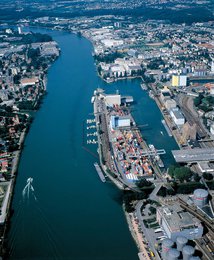Cross-border economic development
Role of public authorities
In general, the public authorities on either side of the border have joint responsibility for providing the right framework and the right instruments for cooperation and for minimising the obstacles hampering cross-border economic development. At present, businesses encounter a number of difficulties when they want to engage in cross-border cooperation or when they look beyond their "natural” territory, bound by the national border. This makes it difficult to mobilise businesses for cross-border projects. A whole series of difficulties arises: funding; distortions of competition (public procurement contracts closed to businesses from the other side of the border); lack of interoperability in terms of standards, insurance, certifications, labour market, etc.
Informing and supporting businesses
Cross-border coordination is required between public-sector actors to provide support for businesses: through dissemination of information (on legal and administrative systems, tax rules, land registration rules, access to public procurement contracts, etc..); by acting as an intermediary and facilitator of contact and exchanges between public- and private-sector actors from either side of the border.
An interesting example is the Franco-German Jurisinfo Service, a cross-border legal information service for French and German companies interested in the neighbouring country. It is attached to the Legal Service of the Strasbourg and Bas-Rhin Chamber of Commerce and Industry.
Another interesting example is the EURODEV CENTER business incubator on the Franco-German border (the area between Forbach and Saarbrücken).
The Enterprise Europe Network helps small businesses to make the most of the European market (not specifically in cross-border areas but at the European level) in collaboration with local business support structures.
The Interreg IV-A project "CHAIN" (Channel Innovation Network), aimed to create a network of Franco-British science parks, innovation centres and incubators for the sharing of best practice in the areas of business support, initiatives to support entrepreneurial spirit, business incubation and financing. In order to promote the internationalisation of businesses, the CHAIN partners also produced the first database of French and British firms.
Helping them to find qualified personnel
Businesses often face difficulties in finding personnel competent in cross-border situations (intercultural, linguistic skills, etc.) while also having specific qualifications or competencies (engineers, etc.). Choosing to focus activities on a single sector in a common territory also enables the retention of competent personnel. One of the challenges of cooperation is to establish a common labour market catchment area, closely linked to the issues of training and compatibility of profiles for the cross-border labour demand. This would include the development of tools for putting employers and job seekers into contact, the reduction of administrative constraints and the organisation of cross-border training courses, internships and apprenticeships in SMEs’ chosen fields; and the facilitation of their integration into cross-border clusters or cluster networks. Another issue often arising with regard to personnel is that of recognition of qualifications on either side of the border. Lastly, there is the need for genuine cross-border public procurement contracts (clauses on state-sponsored back-to-work jobs, allotment, clauses on the status of contractors, etc.) as well as effective communication for the launching of consultations (e.g. multilingual website). (See also the thematic factsheets on Employment and Education, training, languages).
Funding the cross-border development of businesses
For SMEs and SMIs seeking to develop in a cross-border context, the question of funding arises. What instruments are available to them for securing the necessary funds for their projects? It is important that the cross-border territory be taken into account effectively by the banking system, which is in theory well equipped to do so since its actors are increasingly multinational. Market forces may be inadequate, however, justifying public funding (venture capital funds, financed by EU funds).
Coordinating public-sector actors on either side of the border
The asymmetry of legal and administrative systems and of fiscal and land legislations, along with difficulties in gaining access to public procurement contracts, continues to be a substantial hindrance to cross-border economic development. This makes it all the more important to improve coordination of public-sector actors on either side of the border in order to identify joint solutions.


